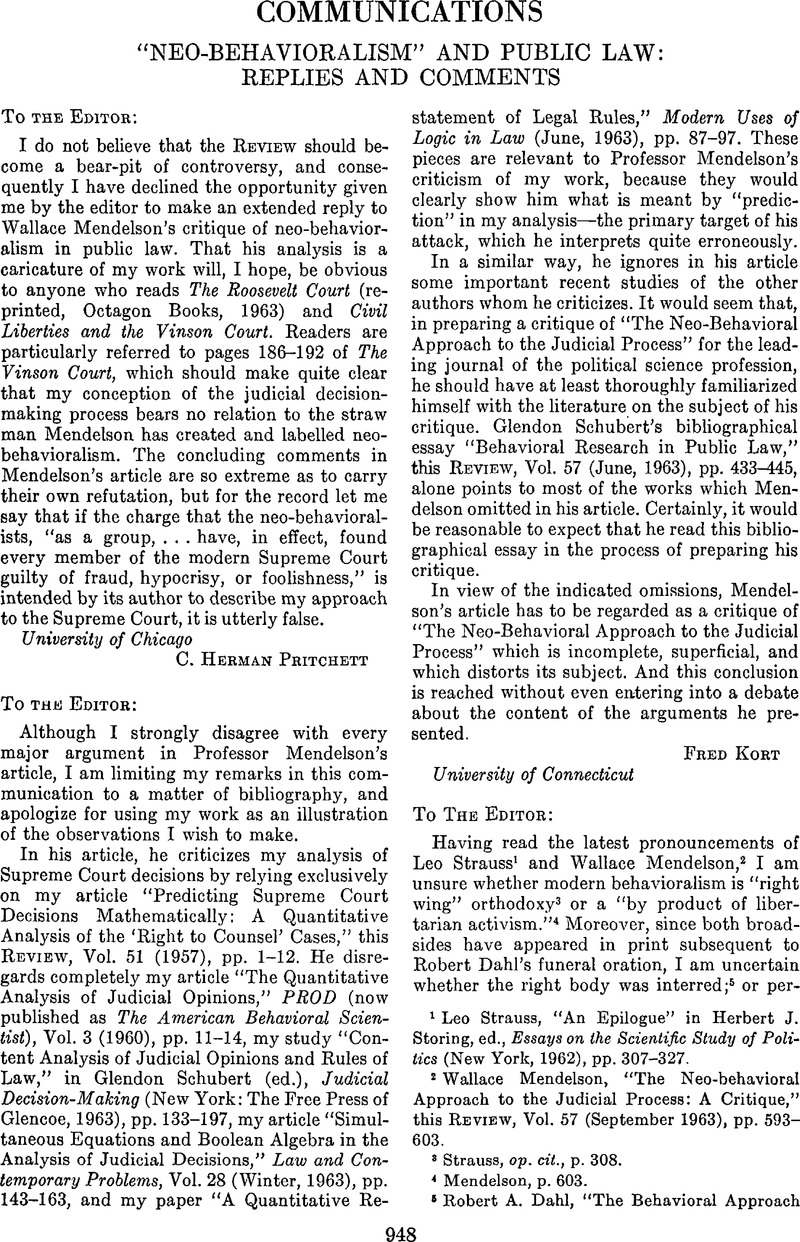No CrossRef data available.
Published online by Cambridge University Press: 01 August 2014

page 948 note 1 Strauss, Leo, “An Epilogue” in Storing, Herbert J., ed., Essays on the Scientific Study of Politics (New York, 1962), pp. 307–327Google Scholar.
page 948 note 2 Wallace Mendelson, “The Neo-behavioral Approach to the Judicial Process: A Critique,” this Review, Vol. 57 (September 1963), pp. 593–603.
page 948 note 3 Strauss, op. cit., p. 308.
page 948 note 4 Mendelson, p. 603.
page 948 note 5 Dahl, Robert A., “The Behavioral Approach in Political Science: Epitaph for a monument to a successful protest,” this Review, Vol. 55 (12 1961), pp. 763–772Google Scholar.
page 949 note 6 Western Political Quarterly, Vol. 13 (06 1960), pp. 288–311CrossRefGoogle Scholar.
page 949 note 7 This paper has been reprinted in Murphy, Walter F. and Pritchett, C. Herman, Courts, Judges, and Politics (1961)Google Scholar; in the Horitsujiho Shiryoban (in Japanese), issue number 4, pp. 61–72 and issue number 3, pp. 45–50; and in Schmid-hauser, John, ed., Constitutional Law in the Political Process (1962), pp. 455–477Google Scholar.
page 949 note 8 That single generalization has also been used to explain judicial behavior in the Japanese Supreme Court. See the scales prepared by Hayakawa, Takeo, “Legal Science and Judicial Behavior,” Kobe University Law Review, No. 2 (1962), pp. 24–25Google Scholar.
page 949 note 9 Parenthetically, Mendelson has himself inferred, from Justice Black's voting record in 59 Fair Labor Standard Act cases decided between 1941 and 1959, that Black was consistently “pro-labor.” Mendelson, Wallace, Justices Black and Frankfurter: Conflict in the Court (University of Chicago Press, 1961), p. 22Google Scholar.
page 950 note 1 New York: Macmillan, 1948.
page 950 note 2 Rodell, , “For Every Justice, Judicial Deference is a Sometime Thing,” Georgetown Law Journal, Vol. 50 (1962), p. 706Google Scholar.
page 950 note 3 See, e.g., Frankfurter's dissent in Monroe v. Pape, 365 U. S. 167 (1961). A behavioralist would very likely score this opinion as reflecting an “anti-civil-rights” attitude, which it assuredly does not. Instead, the opinion, which is, I submit, a blatant example of activism, reflects an insistence that states must retain the responsibility for punishing common crimes even if these are within the constitutional reach of Congress, and even if the will of Congress to punish them must be judicially overridden.
page 951 note 4 Compare, for example, Frankfurter's concurring opinions in Sweezy v. New Hampshire, 354 U. S. 234, 255–267 (1957), and Watkins v. United States, 354 U. S. 178, 216–217 (1957), with his silent acquiescence in Uphaus v. Wyman, 360 U. S. 72 (1959), and Barenblatt v. United States, 360 U. S. 109 (1959).
page 951 note 5 Mendelson, , Justices Black and Frankfurter: Conflict in the Court (Chicago: University of Chicago Press, 1961), pp. 21–22, 24, 29, 40Google Scholar.
Comments
No Comments have been published for this article.